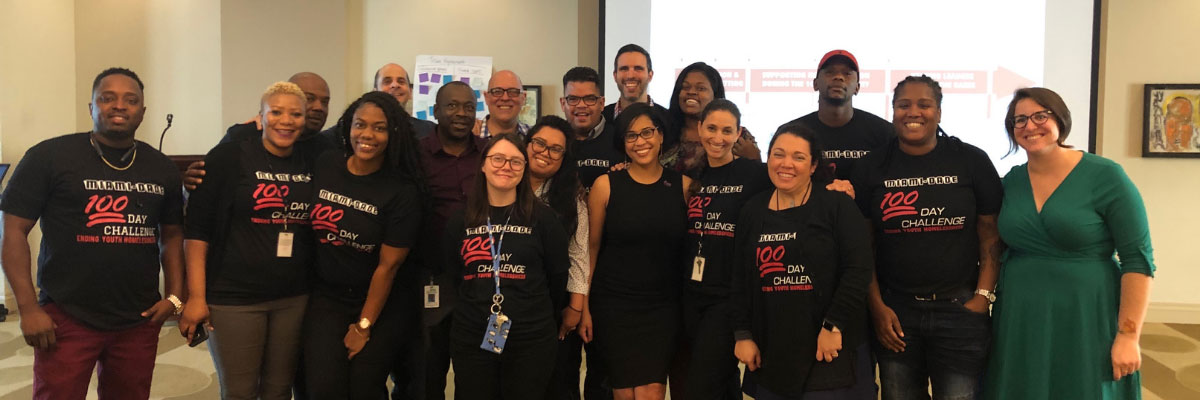After being recognized as a community that Effectively Ended Veteran Homelessness in 2018, the Homeless Trust was among 10 communities selected to participate in a Grand Challenge to end homelessness for youth of color and LGBTQ+ youth. A collaborative effort facilitated by A Way Home America (AWHA) and local community organizations, the initiative is driven by youth with lived experience of homelessness to establish a comprehensive system that can identify homeless youth, get them safely housed, and ensure their experience with homelessness happens only one time.
“The Grand Challenge is an ambitious community-based initiative that is driving forth progressive, pragmatic solutions to end youth homelessness. As a community, we’re combining the power of youth expertise and provider know-how with the technical knowledge and experience of the Homeless Trust to develop solutions that are informed and guided by real-time data. For our LGBTQ and Black and brown youth, the housing and service solutions that are emerging from the Grand Challenge have the potential to be lifesaving,” said Pauline Green, Executive Director of The Alliance for GLBTQ Youth.
Youth homelessness is a largely hidden problem. Housing shortages, increasing rent, familial rejection and abuse, and a variety of other financial and relational issues at home can lead to unsafe or unstable temporary living arrangements for young people. Young people impacted by the child welfare and criminal legal systems are more likely to experience homelessness once they exit these systems. The scale of this problem and the shifting nature of this hard-to-count-population requires a solution that addresses the specific causes of youth homelessness and the unique developmental needs of youth and young adults. Centering LGBTQ+ youth and young people of color in this work is critical because both groups experience homelessness at staggeringly disproportionate rates. In a 100-Day period in 2018-2019, it was found that LGBTQ+ youth represented 62% of youth experiencing homelessness in Miami-Dade, while youth of color represented 75% of youth experiencing homelessness.
The Trust and providers partnered with young people in the community who had first-hand experience with homelessness in order to develop a tailored support system. This group of youth leaders and advocates is called the Youth Voice Action Council (YVAC). “We provide tools, skills, leadership building, and professional development. That way they become leaders of the movement to end homelessness,” said Audrey Aradanas, Assistant Director of Programs at Miami Homes for All. Miami Homes for All serves as the backbone support of the Miami-Dade youth homeless initiative, the Helping Our Miami-Dade Youth (HOMY) Collective. This is a collective impact model with over 100 organizations involved to prevent and end youth homelessness and works hand-in-hand with the YVAC members. Even throughout the pandemic, the YVAC created its own outreach and engagement committee under the HOMY Collective and they have continued recruiting other youth from middle schools and high schools to support their efforts.
“Ensuring that youth with lived experience of homelessness have both a strong voice and a place at the table to create policy and procedures in order to prevent and end youth homelessness is a key to success in the mission of the HOMY Collective,” explained Debra Albo Steiger, Director of Community Outreach and District Homeless Liaison at the Miami-Dade County Public Schools’ Project UP-START Program. “The YVAC members are involved in both the HOMY Collective and with the Miami-Dade Homeless Trust to work with all stakeholders to prevent and end youth homelessness in Miami-Dade County.”
One of the outcomes of Miami-Dade’s investment in ending youth homelessness is the creation of Youth Access Points. Before, young people had to call the Homeless Helpline or connect with an outreach worker on the street. “Young people are a special population,” said Audrey. “A lot of youth may not feel comfortable going to someone they don’t know.” Instead, with Youth Access Points and an after-hours policy, youth can call Educate Tomorrow, Miami Bridge, Lotus House, Camillus House, Citrus Health, and other service providers directly.
Since the creation of these Youth Access Points, HOMY and the Homeless Trust are beginning to see that youth experiencing unstable housing are increasingly able and willing to access services that are needed for them to become stably housed. That means that the youth access points are better at identifying and engaging youth and also means that housing providers are learning better ways to serve young people.
What’s next?
The Youth Voice Action Council is planning to lead a HOMY summit in the summer of 2021. They will be pitching their ideas and presenting ways to improve the Continuum of Care’s system for reaching young people. One of the ways they want to improve services is by creating a referral system between the Homeless Trust, Thriving Mind South Florida, and other systems such as domestic violence organizations. Another priority is reducing returns to homelessness of youth who were homeless in the past, with the ultimate goal of ensuring that homelessness is a one-time experience
There is still much work to be done, but the ambitions of the Grand Challenge team and the Homeless Trust’s own efforts to end youth homelessness will continue to provide the connections and momentum necessary to ensure that every young person has safe and permanent place to call home.
For real time updates on youth homelessness in Miami-Dade County, see the community dashboard.



